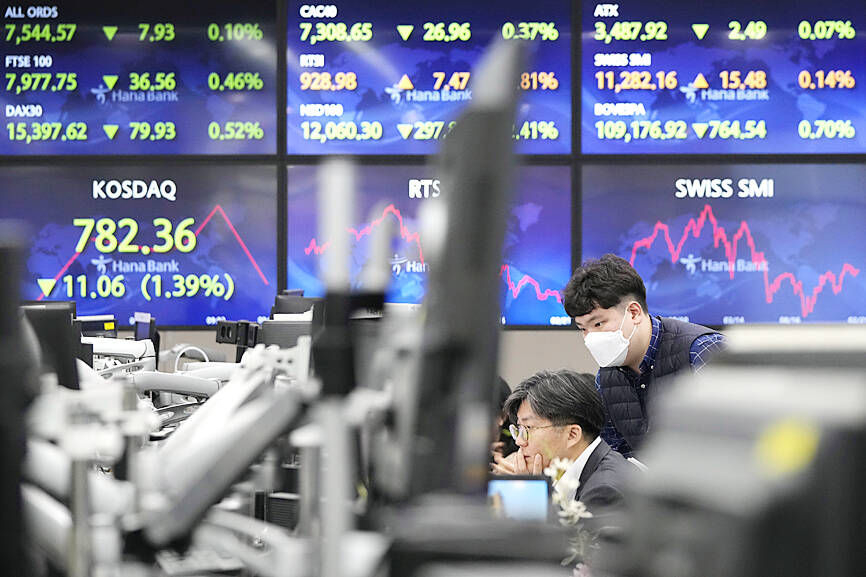Asian financial stocks fell for a second day as the failure of Silicon Valley Bank (SVB) deepened concerns that soaring interest rates are eroding balance sheets across the sector.
The MSCI AC Asia Pacific Financials Index dropped as much as 1.3 percent yesterday, hitting its lowest level since Dec. 20 and adding to Friday’s 2.2 percent slump.
Japanese bank shares were particularly hard hit, with a gauge tracking the sector falling 4 percent after slumping 5.4 percent on Friday.

Photo: AP
Asian lenders declined even as US authorities on Sunday raced to stem jitters about the health of the nation’s financial system, pledging to fully protect all depositors’ money following the collapse of SVB while also giving any banks squeezed for cash easier terms on short-term loans.
Fears of contagion from the largest US bank failure since the 2008 financial crisis are spreading around the world, upending the outlook for everything from riskier assets to US interest rates.
Despite US government intervention, stalwart investors such as Pershing Square founder Bill Ackman predict more casualties in the US banking system, and some start-up founders have warned that SVB’s failure could lead to wipeouts in the sector.
“The market should not underestimate the risks of SVB saga, as its problems are not unique, including rising financing costs and huge investment losses due to asset-debt maturity mismatch,” China International Capital Corp (中國國際金融) analysts including Liu Zhengning (劉政寧) wrote in a note on Saturday.
It might be worth showing some “attention to non-bank financial institutions, which may be sitting on high leverage and maturity mismatch as they stayed in low interest environment for too long,” they said.
Mitsubishi UFJ Financial Group Inc, Sumitomo Mitsui Financial Group Inc and Japan Post Bank Co all fell more than 3 percent. South Korea’s Shinhan Financial Group Co and Hana Financial Group Inc slumped before erasing losses, while Australia’s ANZ Group Holdings Ltd and National Australia Bank Ltd dropped more than 1.5 percent each.
“The point that caught the eye of the bond market is that SVB has sold most of its available-for-sale bonds, which carried net unrealized losses,” SMBC Nikko Securities analyst Masao Muraki wrote in a note on Friday.
“There are concerns that other US banks and Japanese banks/life insurers will follow suit amid renewed inflation fears and rising long and short-term interest rates,” Muraki wrote.
To be sure, some market participants have said that Asia is likely to face limited contagion risk due to superior growth prospects, lenders’ diverse customer base and improving asset quality.
Banking stocks in China and India bucked a broader weakness in the sector amid low exposure to the US. Industrial and Commercial Bank of China (中國工商銀行) rose as much as 3 percent, while India’s ICICI Bank Ltd advanced 1.5 percent.
Elsewhere, a measure of the biggest Philippine banks slid as much as 1.9 percent as all of its nine components declined. Bank of the Philippine Islands, Security Bank Corp and Rizal Commercial Banking Corp each fell more than 2 percent.

When an apartment comes up for rent in Germany’s big cities, hundreds of prospective tenants often queue down the street to view it, but the acute shortage of affordable housing is getting scant attention ahead of today’s snap general election. “Housing is one of the main problems for people, but nobody talks about it, nobody takes it seriously,” said Andreas Ibel, president of Build Europe, an association representing housing developers. Migration and the sluggish economy top the list of voters’ concerns, but analysts say housing policy fails to break through as returns on investment take time to register, making the

EARLY TALKS: Measures under consideration include convincing allies to match US curbs, further restricting exports of AI chips or GPUs, and blocking Chinese investments US President Donald Trump’s administration is sketching out tougher versions of US semiconductor curbs and pressuring key allies to escalate their restrictions on China’s chip industry, an early indication the new US president plans to expand efforts that began under former US president Joe Biden to limit Beijing’s technological prowess. Trump officials recently met with their Japanese and Dutch counterparts about restricting Tokyo Electron Ltd and ASML Holding NV engineers from maintaining semiconductor gear in China, people familiar with the matter said. The aim, which was also a priority for Biden, is to see key allies match China curbs the US

NOT TO WORRY: Some people are concerned funds might continue moving out of the country, but the central bank said financial account outflows are not unusual in Taiwan Taiwan’s outbound investments hit a new high last year due to investments made by contract chipmaker Taiwan Semiconductor Manufacturing Co (TSMC, 台積電) and other major manufacturers to boost global expansion, the central bank said on Thursday. The net increase in outbound investments last year reached a record US$21.05 billion, while the net increase in outbound investments by Taiwanese residents reached a record US$31.98 billion, central bank data showed. Chen Fei-wen (陳斐紋), deputy director of the central bank’s Department of Economic Research, said the increase was largely due to TSMC’s efforts to expand production in the US and Japan. Investments by Vanguard International

STRUGGLING TO SURVIVE: The group is proposing a consortium of investors, with Tesla as the largest backer, and possibly a minority investment by Hon Hai Precision Nissan Motor Co shares jumped after the Financial Times reported that a high-level Japanese group has drawn up plans to seek investment from Elon Musk’s Tesla Inc to aid the struggling automaker. The group believes the electric vehicle (EV) maker is interested in acquiring Nissan’s plants in the US, the newspaper reported, citing people it did not identify. The proposal envisions a consortium of investors, with Tesla as the largest backer, but also includes the possibility of a minority investment by Hon Hai Precision Industry Co (鴻海精密) to prevent a full takeover by the Apple supplier, the report said. The group is